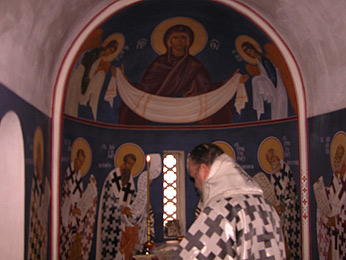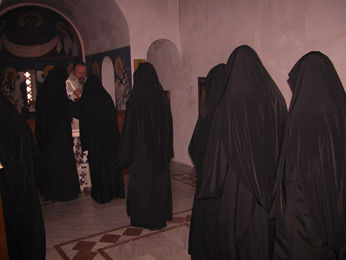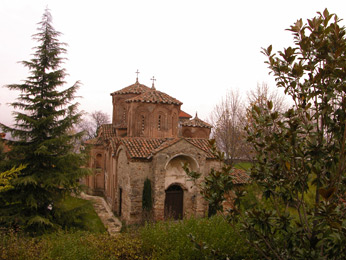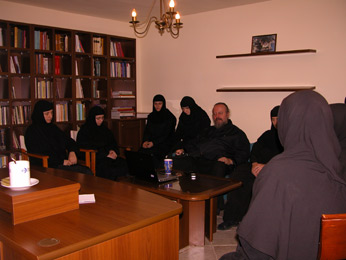Divine Liturgy in Veljusa ( 04.12.2009 )
A Monastic Reminder Obedience The sole reason why we live precisely in a monastery are the necessary conditions provided by this place so that we easier bring our fallen mind, through crucifixion of the reason (intellect), into an effective process of healing. Obedience and prayer are crucifixion of the reason, of this world’s logic. Sometimes voluntary, sometimes involuntary, and most often ascetically. Correspondent to them who are still freeing their heart and their mind from the passions. Little by little the struggle transforms from external into, conscious and free, internal. Obedience is faith and trust in God rather than in (a) man. The spiritual father can either be an instrument or a personal guide or a faithful witness to God’s will. Either way he is necessary. Exile Living as an exile is an indispensible struggle for absolute renunciation of the world that lasts until the acquisition of the gift of the mind-and-heart prayer. Absolute means absolute. The dead man’s grave can be visited by anyone, yet the dead man does not come out of his grave, unless he hears his Master’s voice. Time is short. There is always an opportunity for repentance, but it is more difficult for us to set free from the great idea about ourselves after the reception of the Great Angelic Schema (or the priestly rank) than before our coming to a monastery. Whoever grasps—he has grasped. Whoever fulfills—he has fulfilled. Whoever fails—he has truly failed. Practice of Prayer The beginner’s prayer is an unceasing ascetical struggle for unity with God. The monastic wakes up and falls asleep with the jesus prayer. The monastic utters the prayer even in his sleep, as a “reward” for the daily labor and as a foretaste of the gift of the graceful unceasing prayer. All else apart from the practice of prayer is desperation and delusion to the monastic. Every unprayerful thought—intrusive thought. One who lives in obedience lives always in prayer as well. And vice versa. And contrary to it. The illumined one’s prayer is miracle-working. The perfect one has no prayer. Giving The entire Christian life is giving. The struggle in every virtue is giving. Prayer is giving. The Communion of the Holy Mysteries is giving. The attitude towards every man is giving. If the other one responds to us with giving, let us give thanks to Christ for our accomplished union in Him, in the Church, and if he does not, let us give thanks to Christ for our likeness to Him. Our attitude towards God is giving. Only in that way will we come to know how much He has, already, fully given Himself to us, in the Dispensation of salvation. Self-knowledge Self-knowledge is permanent awareness of our fallen and ill state; it stems from our concrete, real personal struggle—to come to love God, the father and the Son and the Holy Spirit, with all our soul, with all our heart and with all our powers; also our fellowman, as ourselves. Self-knowledge is a precondition of knowledge and of repentance. Of forgiveness and of self-condemnation. Of mourning as well. Self-knowledge is awareness that He, out of no thing previously existing, has brought us into being, by His image and likeness. Thankfulness Let us give thanks to God, always, on behalf of everyone and for everything. Let us give thanks to Him for all that seems to us good as well as for all that seems to us bad. The great consolation and joy are there hidden when we thank God in the second case rather than in the first. If we do not taste the great consolation and joy, it means that we do not thank Him wholeheartedly. Thanksgiving attracts all the greater and all the more perfect gifts of God. To everyone who has, i.e. who gives thanks, more will be given—to become a son of God. Most of all, let us give thanks to Him for the Mother of God, our Most Holy Sovereign Lady the Theotokos and Ever-Virgin Mary, through Whom we receive every gift of God. Metropolitan Nahum of Strumica (as recorded by the Sisters) 


